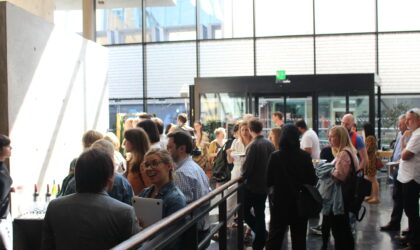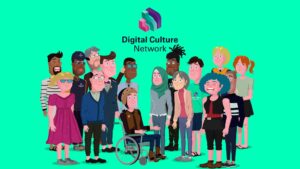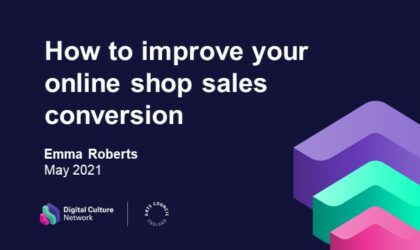
Beginner Read Audience Data Collection and Evaluation
Audience research is the process of gathering information about the people who visit you or see your work, use your services, or engage with your organisation.
In this article
Introducing newcomers to the world of digital, or even just specific digital specialisms such as the ones our Tech Champions have, can be tricky. The abundance of information out there online can be confusing, none more so than the myths we’ve been guided to believe by some sources.
We often hear the same misconceptions here at the Digital Culture Network and this mutual experience has created a team ambition. Let’s bust the most common myths out there in the digital realm!
During a recent chat with our Tech Champions about their experiences with organisations and individuals in the creative and cultural sector, it became evident that everyone has been party to some bad information at one time or another.
This article aims to unpick the myths you’re likely to encounter whilst working on a digital project or more broadly in the sector. It’s important to us to foster an environment of open communication and to encourage you to seek clarification if something seems to be a rule where perhaps it should not. Maybe you will get your answers in this article or maybe you are inspired to question your motives for working in the ways you do. If you want to question your methods or pre-conceived ideas of working in digital, why not reach out to the Digital Culture Network?

One of the big myths is that by making content accessible, you’ll make it ugly.
The opposite is more likely to be true! The things that you do to make sure content is accessible to all people are also the things you’d do to make it perform better.
Examples could be: speed up your website, make it discoverable in searches, maintain a consistent approach, and make sure information is easy to understand and follow.
If you think about accessibility right from the start of your creation process, you’ll be making more attractive and successful content, and saving yourself a lot of time!
One of the biggest myths around digital content creation is the need for the latest and greatest tech to help us deliver our vision. An entire industry of social media influencers has sprung on to our screens to tell us about why last year’s greatest piece of equipment is not as good as this year’s equipment and so on.
I’m here to tell you that nobody cares about your camera equipment. Sure, a client might expect to see a massive camera and lights if they’re paying for a corporate video but, your typical social media audience won’t care or even notice if you’ve made it on a smart phone or cinema camera. They will care about your audio quality as they want to be able to hear what you’re saying and of course, hear the story.
Ask yourself:
What are you doing for the audience?
Why should they continue to watch your video?
What would they want to see next from you?
It annoys me when videos ask for a like and subscribe before they’ve even started. Think of your audience first. What would give them the reason to subscribe to your channel? Deliver first and let them decide if they want to see more from you.
And remember you don’t need the latest 8K full frame cinema camera using the latest anamorphic lens that was used on that Hollywood movie. Just pull out your phone, make sure your audio is clean without background noise and your subject can be heard, then press record. Let creativity take over and have fun! Whack it onto CapCut or some similar free editing software and marvel at your handiwork, even despair at your mistakes, it’s ok we all make them!
Edit, export, upload and repeat the process for your next video which will be better than your last, but not as good as your next.
A MASTERPIECE!
Creating a new website is complicated, difficult, and expensive right?
It doesn’t have to be if you follow a few simple steps and take the right advice. Far from being a drain and a hassle, it should be an enjoyable and rewarding experience.
If you have no experience with websites, don’t worry. Accept there will be a learning curve and embrace that. Firstly, have a chat with your peers about their website experiences. Look online and do a little research of your own. Speak to us at the Digital Culture Network – we can help guide you through the process to ensure you are doing things right and getting good value for money.
Myth: Audiences don’t want to help with surveys!
Advice: A lot more people than you might think are happy to help and share their thoughts. As a lot of arts & culture is a one-way relationship – the artist and the audience – many people really enjoy the opportunity to communicate back and be heard. They will also be willing to help your organisation – especially as they’ve just had a unique or interesting experience, possibly for free.
When I was an interviewer carrying out surveys in museums and galleries, visitors would frequently say that speaking to me was one of the highlights of their visit. I wasn’t doing anything special – if you make the pitch personal, warm, and friendly, listen to them thoughtfully, and thank them earnestly for their time and help, people can open up very quickly and it can be a great touchpoint for them.

We Shine Portsmouth. Photo © Elliot McRae
The greatest myth in Search Engine Optimisation (SEO) is that SEO is an esoteric, highly technical field and that making exclusively technical changes to your website will result in increased rankings.
In reality, begin with thinking about what kind of search terms people interested in your work might type into a search engine like Google. Do your keyword research and start thinking strategically about your content. This is a much quicker win in SEO than investing in complex, technical work only.
1. If I build an online shop, they will come!
Sadly this isn’t true – successful eCommerce isn’t just about a building an online shop. Building a great online shop is important – but unless customers know it is there, you won’t make any sales.
So, it’s really important to think about marketing for your online shop – who are your customers and how are you going to communicate with them? What messages will you share with your potential customers that will entice them to visit your shop?
Unsurprisingly this leads to thinking about channels such as an email newsletter and social media as vital for eCommerce. It’s also important to think about how your online shop pages might rank with search engines like Google –and whether it might be commercially viable for you to invest in paid online advertising to bring traffic to your online shop.
2. We’re too small an organisation to run an online shop
Not necessarily! eCommerce software costs and the ease with which online shops can be built have improved massively in recent years. As well as selling existing physical stock, there are options to sell print-on-demand products which can eliminate cashflow issues too.
I have also seen plenty of examples of small teams managing the logistics of picking and packing orders via hybrid front-of-house or retail teams. So even if you are a small organisation, it is worthwhile considering an online shop. Here at the Digital Culture Network we can help you evaluate your audience size and model out whether eCommerce could be a financially viable option for you.
I often hear that a digital strategy is all about the tech. In fact, a digital strategy is often about changing habits and augmenting human capacity to reduce burden, drive higher productivity and ultimately, to solve a problem that will support your wider business objectives.
My best advice would be – first and foremost – make sure everyone understands the problem you are trying to solve and is clear about the journey ahead.
Also, be aware that digital strategies are continuous and never really end, so being prepared and adaptable if plans do change is a great attitude to have.
We have all heard this myth! You need to have a presence on every social media platform.
The reality is that if you have a small team – or if it’s just you managing your social media – then maintaining a social media account across multiple platforms isn’t going to be sustainable. But also, it isn’t necessary!
Focus on the platforms where your audience is and where you can speak to them in a way that makes sense for you. You’re better off building up a strong relationship with an audience on a couple of social media platforms than trying to stretch yourself across every new one that pops up and just churning out any old content.

Blast Theory: 2097: We Made Ourselves Over
There’s a rumour that Google Analytics 4 is rubbish!
Google certainly didn’t handle the rollout of their new website analytics platform very well, but it can be very good – if set up correctly. The old version provided users with an array of different (but mostly useless) reports. The new version, Google Analytics 4 (GA4), requires you to think about what you want out of it first and this is a big ask for new users.
If you are approaching the platform for the first time, consider what you would like to get out of it. Where are users finding the website? What marketing activity is working well? What content is most popular? By asking these questions first you can plan what data needs to go in (the set up) and what data need to come out (the reports).
Our series of webinars on GA4 go through these steps and we’re available for 1-2-1 support to help you become confident and get the most out of GA4.
One huge myth is that CRMs are only for storing contact data.
While up-to-date contact information is a vital piece of your CRM, it can be a powerful tool to centralise your data and create a holistic picture of your audience.
Think through the different user journeys that an individual may have with your organisation – as an event attendee, a volunteer, a member, making a donation, or purchasing from your shop.
What information would you collect about this individual across these different processes? By centralising information across the different strands of your work, you can get a more complete sense of the scope of an individual’s engagement with your organisation, as a whole, over time.
The greatest myth is that Email Marketing is dead because young people don’t subscribe to or engage with marketing emails.
My advice would be – don’t throw the baby out with the bath water!
Test your audience and use your own evidence to see if email works for you because it is still the best performing marketing channel. Remember that with email marketing you own the contact data, you target, track and set the timing, you can test and evaluate.
I have heard it said that SEO is easy and yields fast results.
It is easy if you’ve been doing it for a long time and if you’re an expert but the same could be said about any skill. SEO takes times to work, expect to wait 3 months before you see results and with a brand-new site the wait could be as long as a year.
Focus on building the best content you can for the least competitive keywords and you’re onto a winner. Check out my article about keywords and their benefits to learn more.
The Digital Culture Network is here to support you and your organisation. Our Tech Champions can provide free 1-2-1 support to all creative and cultural organisations and individuals who are in receipt of, or eligible for, Arts Council England funding. If you need help or would like to chat with us about any of the advice we have covered above, please get in touch. Sign up to our newsletter and follow us on Twitter @ace_dcn for the latest updates.
Beginner Read Audience Data Collection and Evaluation
Audience research is the process of gathering information about the people who visit you or see your work, use your services, or engage with your organisation.
Beginner Read Digital Accessibility
The goal of digital accessibility is to create digital products and services that are inclusive and provide equal access to information and functionality to all users, regardless of their abilities. This article aims to introduce you to the principles of digital accessibility, and shed some light on some of the things you need to know when creating accessible digital content.
Beginner Read Digital Strategy
An effective digital strategy can be vital to your organisation’s success. Read on to understand the key considerations when developing yours.
Beginner Read Case Studies
The Foundling Museum believes in creative action transforming lives, to stimulate imaginations and enrich young lives. Museum Director Caro Howell explains how the museum navigated a hybrid digital/analogue approach in order to support and inspire its network of volunteers and young care-leavers after the advent of Covid-19.
Beginner Read Webinars eCommerce and Merchandising
A webinar for arts and culture organisations to learn about how you can optimise online sales conversions and improve your customer sales cycle to encourage customer loyalty.
Beginner Read Websites
The World Wide Web Consortium (W3C) develops standards and guidelines to help everyone build a web based on the principles of accessibility, internationalization, privacy and security.




